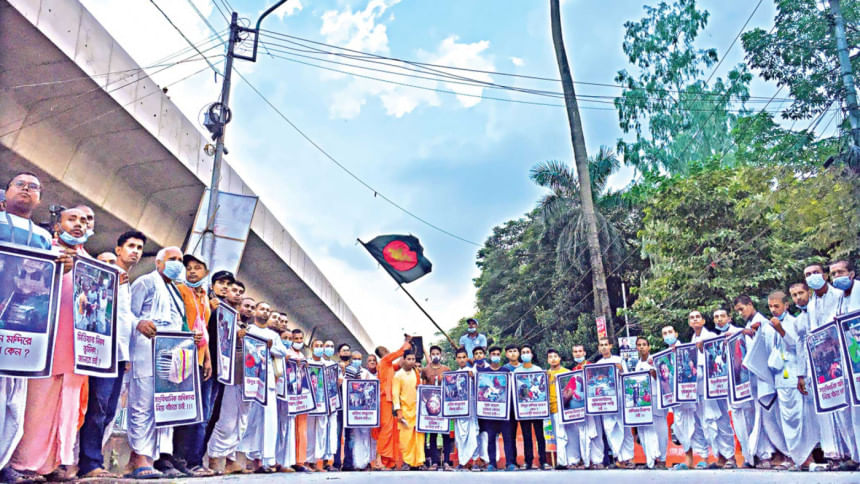The urgent need to battle the growing rise of hatred

My recent open letter to Hindu brothers and sisters published in this newspaper was accompanied by a photograph that is seared in my memory.
Two Hindu women stand amid the destruction wrought by vicious religious bigots. On the left, a woman is crying inconsolably. It is the other woman on the right, comforting the crying woman, whose image continues to haunt me.
Her eyes are dry. Her piercing gaze, fixed somewhere on the horizon, is filled with horror, pain and utter incomprehension at the barbarity of human beings.
This image is a distillation of the terrible havoc that hatred can wreak.
All over the world, purveyors of hatred are having a field day. In South Asia, vicious sectarian hatreds manifest in many horrible ways, and defenceless minorities bear the brunt of the violence. Whether it's Muslims in India, Ahmadiyyas and Shias in Pakistan, Shia Hazaras in Afghanistan, Tamils in Sri Lanka, or Rohingyas in Myanmar—what makes all these attacks so reprehensible is that the attackers are members of the majority community.
In a strange, toxic inversion of reality, a venomous majoritarian sense of victimhood and grievance is fanning the flames of hatred worldwide.
The seeds of this hatred may be in grievances real or perceived, but a sinister set of circumstances have caused it to mushroom into a full-blown, global crisis. Sometimes, it is petrodollar-fuelled extremist Islamist groups like Islamic State and al-Qaeda, and a variety of fellow travellers like al-Shabab in Somalia, Boko Haram in Nigeria, and ISIS-K in Afghanistan. (The Taliban itself has Pakistani military intelligence's fingerprints all over it.)
More alarming, however, is the hatred fomented in efforts that are not covert or clandestine at all. Opportunistic politicians from majority groups gleefully fan the flames of fear and draw rich political dividends, creating a frenzy of panic and fear in the majority community, with dire consequences for terrified minorities. When hatred has a majoritarian edge, it becomes doubly dangerous. Now the levers of democratic power can be deployed to condone—if not legitimise—hatred.
We see chilling examples of this in India and Myanmar. In India, brazen, sectarian remarks and vicious acts of violence are often greeted by a ruling party with what may be politely called callous nonchalance. In Myanmar, an inspiring leader who earned the world's admiration for her courageous leadership against oppression has lost her sheen after her refusal to acknowledge the plight of an aggrieved minority.
Gone are the days when the West could cast a patronising eye on such developments. Like Covid-19, hatred is now a global pandemic.
In the US, where I live, one of my most distressing experiences in the recent past has been to witness all norms of civility in politics discarded scornfully. Former President Donald Trump is the first US president in history to refuse to concede after losing an election, and his debunked claims of a "stolen" election has, in a bizarre fashion, become a litmus test of loyalty for much of the Republican Party. As a slew of conservative outlets fan the flames of incendiary partisanship, hatred and violence are sure to follow.
In an article titled "Menace Enters the Republican Mainstream," The New York Times reports: "From congressional offices to community meeting rooms, threats of violence are becoming commonplace among a significant segment of the Republican Party. Ten months after rioters attacked the United States Capitol on January 6, and after four years of a president who often spoke in violent terms about his adversaries, right-wing Republicans are talking more openly and frequently about the use of force as justifiable in opposition to those who dislodged him from power."
It's not just the US. The debate over Brexit in Britain has been so acrimonious that it has divided friends and families. Right-wing, anti-immigrant parties which were once in the fringes are gaining strength in France and Germany.
I honestly believe that the restoration of comity is a vital global challenge that is no less urgent than battling climate change or reducing poverty and economic disparity.
In 1994, Unesco marked the 125th anniversary of Mahatma Gandhi's birth with its proclamation of November 16 as the International Day for Tolerance. Unesco suggests five guidelines for battling intolerance: laws, education, access to information, individual awareness, and local solutions. All true, if a little facile.
We can make headway in tackling the menace of hatred if we address the underlying causes. It is important to recognise that a broad sense of socioeconomic apprehension has given an opening to bigots and political rascals. Those who profess an abiding belief in tolerance and humanity will need to get out of their comfort zones and take on the purveyors of hatred. This is actually a challenge, because the challenge to hatred has to come from within the groups that are poisoned by hatred of others. This is what Marxist sociologist Herbert Marcuse called an "immanent critique."
So in Bangladesh, it is the task of humane, pious Muslims to create a groundswell of opinion that makes it clear that violent attacks on innocent non-Muslims will be considered an attack on their reputation and beliefs. Or in the US, it is incumbent upon Republican leaders to join Wyoming Republican Congresswoman Liz Cheney, for instance, and say violence and disregard for the rule of law are anathema to democratic values.
Sure, it's a tough row to hoe. Cheney is treated more like a pariah than the brave hero that she is in this particular cause. We can draw inspiration from the great leaders of yesteryear who never moved from their commitment to tolerance.
Gandhi literally gave his life for his staunch belief in tolerance. His favourite Tagore song was "Jodi tor dak shuney keu na ashey tobey, ekla cholo re (If nobody responds to your call, then go forth alone)." Think of the US civil rights leader Martin Luther King, Jr. He led African-Americans at a time of racist violence, when his people faced egregious racial discrimination, but he drew inspiration from Gandhi and refused to meet violence with violence. Think of South African leader Nelson Mandela, whose beatific smile and genial patrician mien was unsullied by the bitter experience of decades of incarceration, as well as terrible racist violence and institutionalised discrimination against black South Africans. Mandela steered his black-majority nation to freedom in a transition that was remarkably, almost magically, free of rancour.
People of goodwill have their work cut out.
How soon will we get there? I would like to cling to Tagore's credo: "Manushey bishwas harano paap (It is a sin to lose faith in man)." But the jaded, cynical soul that I am, my cautious optimism is closer to former Israeli Foreign Minister Abba Eban's wry observation: "Men and nations do behave wisely, after all other alternatives have been exhausted."
Ashfaque Swapan is a writer and editor based in Atlanta, US.

 For all latest news, follow The Daily Star's Google News channel.
For all latest news, follow The Daily Star's Google News channel. 



Comments